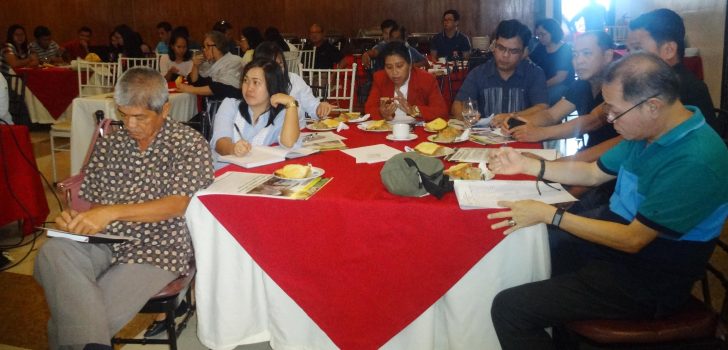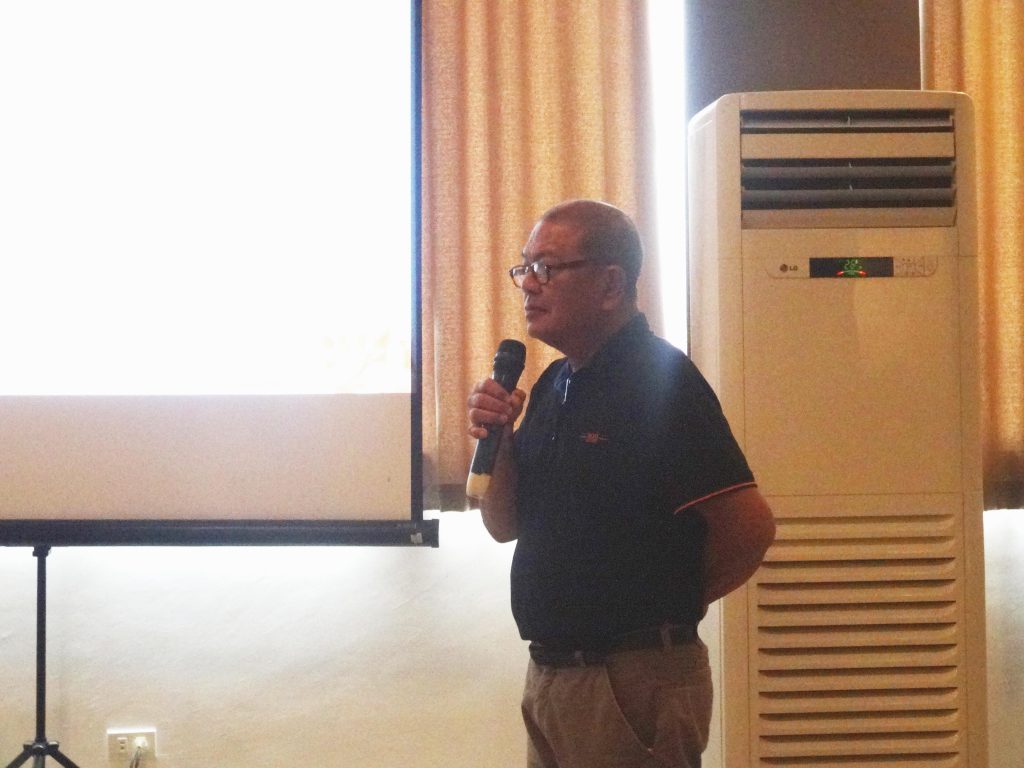 The Bicol Regional Project Advisory Board (RPAB) reviews the Sorsogon Pili Enterprise Cluster subproject for the funding of PRDP under its enterprise development (I-REAP) component. (Photo by Michelle Angela Alfigura, DA-PRDP RPCO V InfoACE Unit)
The Bicol Regional Project Advisory Board (RPAB) reviews the Sorsogon Pili Enterprise Cluster subproject for the funding of PRDP under its enterprise development (I-REAP) component. (Photo by Michelle Angela Alfigura, DA-PRDP RPCO V InfoACE Unit) Sorsogon sees growth of pili industry with PRDP-funded pili enterprise
LEGAZPI CITY, ALBAY – Prospect is bright for Sorsogon’s pili industry with the approval of the P26.21 million-worth enterprise development (I-REAP) subproject funded under the Department of Agriculture Philippine Rural Development Project (DA PRDP).
On September 19, the Bicol Regional Project Advisory Board (RPAB), an interagency multi-disciplinary team mandated to review and approve subprojects for PRDP funding, has approved the Sorsogon Pili Enterprise Cluster.
The I-REAP subproject will be implemented by a cluster of three cooperatives, namely, the Gubat St. Anthony Cooperative (GSAC) as lead proponent group, the Sorsogon Pili Producers Cooperative (SPPC), and the Barcelona Development Cooperative (BADECO).
The enterprise will engage in processing quality pili oil and pili products such as candies and confectioneries. It will also venture in processing pili pastillas, sugar-coated pili, salted pili, crispy pili, and roasted pili out of pili kernel.
About 1,063 members are projected to benefit from the approved I-REAP subproject. PRDP will fund the Sorsogon Pili Enterprise Cluster’s proposed construction of two pili processing buildings, two warehouses, and one drying pavement.
The Project will also provide two closed type trucks, one forward truck and one motorcycle. Moreover, the cluster of cooperatives will purchase supplies, tools, and equipment to be used in pili processing through the PRDP.
“Talagang lalaki na ang industry natin sa pili. Dito sa PRDP, maglalabas tayo ng isang packaging na magiging unique din for Sorsogon (Our pili industry will now grow. With PRDP, we shall create a packaging that will be unique for Sorsogon),” PRDP Bicol I-REAP Component Head and Deputy Project Director Adelina Losa said. Losa sees Sorsogon’s pili industry competing with Singapore’s Pili Pushers and the United States’ Peelè: The Golden Nut.
To support the Sorsogon Pili Enterprise Cluster’s future global pursuits, the RPAB recommended commissioning an academe such as the Sorsogon State College as the center for pili in Bicol. This will be done through a consortium in order to sustain the supply of pili in the province.
With numerous industrial, commercial, environmental, and nutritional benefits, pili continues to be one of Bicol’s high-value crops. It is marketed outside the region in various product forms such as shelled, kernel, and pili candies, while pili oil from pulp and kernel as well as pili elemi are emerging commodities.
The Philippine Statistics Authority reports show that in 2015, the Bicol Region remains as the major pili producer in the country contributing 85 percent or 6,258 tons of the domestic production.
As of 2015, Bicol has the biggest share in terms of area planted to pili and number of pili bearing trees at 1,910 hectares and 141,887, respectively. Sorsogon accounts for more than half of the country’s total pili production at 4,052 metric tons in 2015. Based on the Value chain analysis (VCA) conducted by the PRDP local and national level planning (I-PLAN) component, most of the big processors in the region get their supply of kernel from Sorsogon because of its big volume of production.
I-REAP is one of the four components of PRDP that is designed to strengthen and develop viable agriculture and fishery-based enterprises by providing technical, financial, and infrastructure support to eligible groups in targeted areas within the priority value chains identified under the VCA-based Provincial Commodity Investment Plan (PCIP) and the Regional Agriculture and Fisheries Modernization Plans (RAFMPs).
PRDP is a six-year World Bank-assisted development project being implemented by the Department of Agriculture that aims to establish a modern, inclusive, value chain-oriented and climate-smart agriculture and fisheries sector.
The RPAB is chaired by the DA Regional Executive Director and composed of heads and representatives of the Department of Trade and Industry, Department of Agrarian Reform, Department of Public Works and Highways, Department of Environment and Natural Resources, Department of Interior and Local Government, Regional Agriculture and Fishery Council, Bureau of Fisheries and Aquatic Resources, and National Commission on Indigenous Peoples (NCIP). ### (Annielyn L. Baleza, DA-PRDP Bicol RPCO InfoACE Unit)

